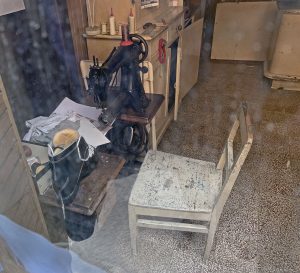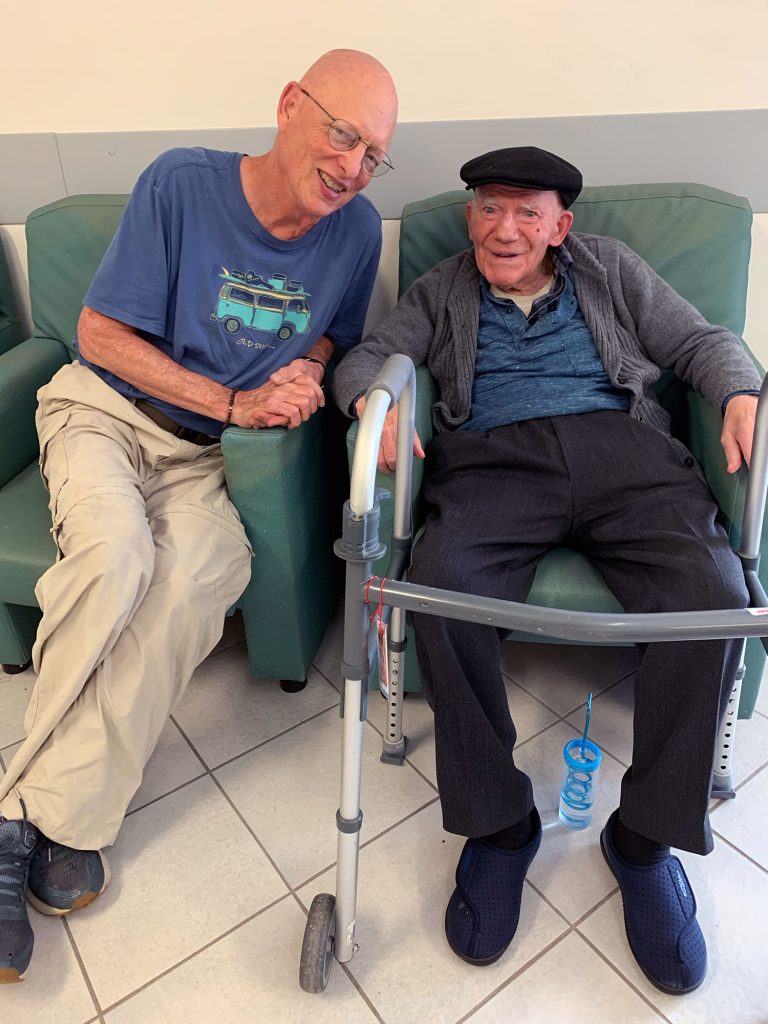When friends ask, what was my favorite thing about our month in Italy, my answer may be a surprise.
For it’s not the stunning Tuscan countryside, the sumptuous food, the laid-back lifestyle. No, it’s not even the delectable Montepulciano red wine.
Hands down, my favorite thing about this fourth return trip to Montepulciano is the relationships forged with the people we’ve meet — most all of whom are natives and townspeople living in this 13th century fortified hill town, perched above the verdant hillsides of vineyards and olive groves.
There’s Gabby, the bookbinder; Giuseppe, the singing shopkeeper; Francesco, the restaurant owner; Silvio, the puppet-maker; Pier Luigi, the linen shop owner; Cesare, the coppersmith; Rinaldo, the olive farmer — the list could go on.

But of all these Italian friends we’ve made over the years, 90-year-old village cobbler Virio Neri stands out. Maybe it’s because I have an affinity for village elders, or because his legacy occupation of shoemaking is so unique, or because of some intangible connection I feel with him.
All I know is that any daily hike up to Montepulciano from our rented farmhouse in the valley below was incomplete without a visit to Signore Neri’s tiny shop on the Corso, the narrow steep main street of the old town.
That Mr. Neri and I could communicate is something of a small miracle; neither of us can speak each other’s native tongue. Nevertheless, with much hand-waving, pointing, gesturing, eye contact and laughing, we understand each other. And I think Lynne’s photographs of those delightful exchanges capture some of those meaningful moments.
Thus, on this visit back to Montepulciano, when we found his shop dark and empty, a tight knot formed in the pit of my stomach. Fearing the worst, we began sleuthing about, asking neighbors of his whereabouts. That’s how we learned that last winter, grieving over the unexpected death of a dear friend, he had abruptly closed his shop and had gone to a rest home.
Didn’t want visitors, one shopkeeper told us.
The sight of his abandoned dark shop, his empty chair beside the antique sewing machine where a single boot rested, mid-way through its repair, was enough to break our hearts. But I wasn’t giving up. I knew where he used to live, # 12, Via Colazzi — just two streets over from his shop.
I left a note in his mailbox, in hopes that it might somehow get to the old shoemaker; perhaps some family member was still picking up his mail.
Several weeks passed with no progress on finding Virio Neri. And we had all but given up hope, when a neighboring shopkeeper told us my note had indeed been delivered to the rest home.
Well, I told myself philosophically. Maybe that’s as good as it gets. And after all, all things must pass. Maybe it’s best to just accept the loss of my old friend and move on.
But the fates had other plans.
A chance encounter
Halloween in Montepulciano is very different than in the U.S. It is much less elaborate and commercialized, and there’s no parents driving kids around to suburban neighborhoods, trolling for candy.
In little Montepucliano, parents on foot escort kids up the narrow (practically car-less) lanes. Often dressed in home-made outfits, children carefully reach into your bag of goodies and remove one item. Yes, just one!
We happened to drop in at an open-air street-front café on Halloween night, armed with a bag of candies. And striking up a conversation with a friendly English-speaking couple at the next table, we chitchatted politely with each other, where we were from, what brought us to Tuscany, where our residences were here. And ,yes, they knew of our street, Via di Martiena.
But when they told me their address, # 14, Via Colazzi, my eyes must have gotten wide and my jaw dropped. The conversation went something like this:
“Do you know Virio Neri?” I asked, stunned.
“Know him?” They responded with a laugh. “Our apartment is directly above his. He’s a dear friend.”
“But he’s in a rest home,” I responded, amazed. “And I was told he doesn’t want visitors.”
“No!” said one of our new friends. “We go see him every week.”
On the scent again
(Ah! Bad reporter! Thrown off the scent by a single inaccurate source. Back to Reporting 101. Rule #1, Corroborate all facts from at least two different independent sources. In Watergate, that was known as the Two-Fink Rule.)
And that unlikely chance encounter on Halloween night led to the address of Mr. Neri’s rest home, where our new friends assured us, he would be glad to see us.

The next day, our final morning, the last possible chance to find Mr. Neri, we checked out of our little farmhouse early and found our way to the northern outskirts of town where we came upon the rest home, a modest two-story brick building nestled among neighboring homes and shops.
Into the front door we went— me with my heart in my throat, to be greeted by a cleaning woman, mop in one hand, bucket in the other.
“Signore Neri?” I inquired.
“Si!” the cleaning woman responded cheerfully, turning and motioning for us to follow her to the elevator.
Note: no security, no receptionist, no sign-in. Just an accommodating custodian granting us full access. Yet another reason to love Italy.
The elevator door slid open, and there, directly across the room, seated in a big chair behind his walker, was my man.
Mr. Neri’s lively blue eyes were affixed attentively at the elevator door, as if he was expecting visitors. After one month of disappointing searches, I could scarcely believe my own eyes.
We spent the next few happy moments talking, laughing and pointing (at the holes in my running shoes) and generally letting him know how special he was to us.
When it was time to go, and we said our last arrivederci, I thanked the heavens for this miracle encounter with the fine old gentlemen. As the elevator door slid shut like a camera shutter, click, a final image — there he sat, blue eyes blazing, his beatific smile sending us on our way.

